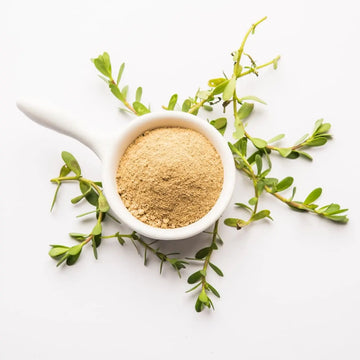Triphala - a herbal formula that supports the gut microbiome
Triphala is a popular Ayurvedic herb, which is considered as one of the most important preparations in Ayurveda. It is a combination of three fruits, namely amalaki (Indian gooseberry), haritaki (terminalii chebula), and bibhitaki (terminalii belerica) . Triphala has a long history of use in Ayurveda and is valued for its many health benefits. This synergistic blend of herbs can be used as a dietary supplement to support digestive health, body cleansing, and overall balance.
Why is it worth using triphala herbs?
-
Improving digestion: Triphala is known for its support for digestive health. It helps regulate intestinal peristalsis, which aids in proper digestion. Taking Triphala regularly can help relieve constipation, bloating, and other stomach discomforts.
-
Body Cleansing : Triphala is also valued for its body cleansing properties. It acts as a natural detoxifier, helping to remove toxins from the body and supporting liver function. Regular use of Triphala can help maintain healthy skin, improve metabolism, and overall cleanse the body.
-
Strengthening immunity: Triphala has immunostimulating properties that support a healthy immune system. Triphala ingredients are rich in antioxidants that can help fight free radicals and strengthen the body's natural immunity.
-
Improves gut function: Triphala supports healthy gut microflora by eliminating harmful bacteria and promoting the growth of beneficial microorganisms. It may also help relieve inflammatory gut conditions such as irritable bowel syndrome.
-
Supporting overall balance: Triphala is known as a balancing tonic for the entire body. In Ayurveda, it is believed that regular intake of Triphala helps to maintain harmony in the body and mind. It can improve energy, stamina and overall vitality.

In addition, numerous additional therapeutic uses described in both Ayurvedic sources and transmitted through tradition have already been verified and scientifically confirmed. In addition to its mild laxative effect, Triphala research has shown that this formula is potentially effective in several clinical applications, such as appetite stimulation, reduction of hyperacidity, antioxidant, anti-inflammatory, immunomodulatory, antibacterial, antimutagenic, adaptogenic, hypoglycemic, anticancer, chemoprotective and radioprotective effects and prevention of dental caries. (1) (2)
Triphala polyphenols modulate the human gut microbiome, thereby promoting the growth of beneficial Bifidobacteria and Lactobacillus while inhibiting the growth of undesirable gut microbes. Triphala's bioactivity is triggered by the gut microbiota to produce various anti-inflammatory compounds.
How to take Triphala:
Triphala is available in various forms such as powder, capsules, liquid or even tea. It can be taken on an empty stomach in the morning or before bed. Dosage should be started according to the recommendations on the package.
Triphala is a prized Ayurvedic herb that offers numerous health benefits. Its unique combination of three fruits makes it a versatile dietary supplement that supports digestive health, body cleansing, and overall balance. If you are looking for natural support for your digestive system and overall health, Triphala may be a valuable addition to your daily routine.
Remember, it is always a good idea to consult an Ayurvedic professional before using Triphala to tailor the dosage to your individual needs and health goals.
Buy here: https://sattva.pl/pl/searchquery/Triphala/1/phot/5?url=Triphala
1) Peterson CT, Denniston K, Chopra D. Therapeutic Uses of Triphala in Ayurvedic Medicine. J Altern Complement Med. 2017 Aug;23(8):607-614. doi: 10.1089/acm.2017.0083. Epub 2017 Jul 11. PMID: 28696777; PMCID: PMC5567597.



